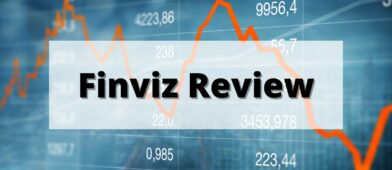The best stock trackers make it easier to research stocks and manage an extensive portfolio. Specifically, you can instantly integrate your brokerage accounts to check your investment performance and stock ratings.
Depending on the platform, you can access in-depth historical data, charts, portfolio analyzers, and model portfolios to enhance your investment strategy seamlessly.
| Best for | Learn more | |
|---|---|---|
| Self-directed investors for nearly any trading strategy | Learn more | |
| Researching stocks and funds for long-term strategies | Learn more | |
| Fundamental stock screener and free stock research tools | Learn more | |
| Investors looking for specific stock recommendations | Learn more | |
| Long-term investors on a budget | Learn more | |
| Free investment portfolio tracking | Learn more |
1. Seeking Alpha
Best for: Self-directed investors for nearly any trading strategy
- Price: Basic (free) or Premium ($4.95 for the first month and then $299/year)
- Free Trial: None
- Stock Screener: Yes
- Model Portfolios: No
- Portfolio Analyzer: Yes
Though you can start using the free version of Seeking Alpha, it has low monthly research limits and minimal tracking features. The Premium version is ideal if you research or trade several stocks each month since you can read unlimited research articles and have full access to exclusive stock ratings and stock screens.
Most individual stocks have bullish and bearish commentary from independent analysts. The stock analysis will include specific ratings, like buy, strong buy, hold, or sell, giving you some insight into the security's standing. You can also quickly link your portfolios to access the latest ratings and research.
While Seeking Alpha Premium doesn’t provide specific stock recommendations, it offers stock screeners for fundamental and technical indicators and its in-house Quant Ratings. The Quant Ratings measure a stock’s performance potential by value, growth, profitability, and earnings-per-share (EPS) revisions.
Seeking Alpha Picks is an excellent add-on if you prefer a model portfolio to self-directed research instead. It provides two monthly picks curated from the best stocks with a “Strong Buy” rating.
Though they don’t offer a free trial period, the first month is just $4.95. This budget-friendly trial allows you to test the tracker to ensure it’s the right choice.
Here's our full Seeking Alpha Premium review for more information.
Pros
- Bullish and bearish commentary
- Impressive stock ratings and screener
- Portfolio tracking tools
Cons
- Limited free membership tools
- Potentially too much info for casual investors
- No model portfolio
Seeking Alpha Black Friday Sale
Seeking Alpha is offering a massive Black Friday sale on both Premium and Alpha Picks, valid until December 5th.
Seeking Alpha Premium is now just $209 (down from $299) and you get a 7-day trial to see if you like it. This price is available to everyone, including previously paid subscribers (no free trial though).
For Alpha Picks, you can get it for $359 a year, down from $499 – a huge $140 discount.
If you want both, you can get it for just $509, which is a $289 discount.
If you've been thinking about it, this is a great time to get a huge discount.
👉 Learn more about Seeking Alpha
⏰ This offer expires on midnight December 5th, don't wait to start the trial!
2. Morningstar Investor
Best for: Researching stocks and funds for long-term strategies
- Price: $34.95 per month or $249 per year ($20.75 per month equivalent)
- Free Trial: 7 days
- Stock Screener: Yes
- Model Portfolios: Best Investments Lists for stocks and funds
- Portfolio Analyzer: Yes
Morningstar Investor is one of the most respected names in the investment industry and is ideal for fundamental analysis. You can thoroughly research stocks, ETFs, and mutual funds with in-depth ratings, fair stock value assessment to its current trading price, and an independent analyst report.
You can also seamlessly link multiple brokerage accounts to its program, taking advantage of professional-grade data and ratings. They’re well-known for providing Morningstar point ratings ranging from one star to five stars, making stock selection much more straightforward.
One of Morningstar's best-known features is its Portfolio X-Ray. This tool enables you to evaluate your positions from multiple angles and identify rebalancing opportunities.
Meanwhile, you can also use the fundamental stock screener and “Best Investment Lists” for stocks, ETFs, and mutual funds to sift through prospective investment ideas quickly.
Here's our full Morningstar Investor review for more information.
Pros
- Stock, ETF, and mutual fund coverage
- Analyst reports
- Extensive fundamental research tools
Cons
- Not ideal for short-term trading
- Expensive monthly fee
- No model portfolios

For a limited time, Morningstar Investor is discounted by $50!
It comes with a 7-day free trial so you can lock in your savings, try the service, and cancel if you don't think it's for you.
3. Stock Rover
Best for: Fundamental stock screener and free stock research tools
- Price: $ 0 to $27.99 per month, depending on plan
- Free Trial: 14 days for Premium Plus
- Stock Screener: Yes
- Model Portfolio: Yes
- Portfolio Analyzer: Yes
Stock Rover offers robust fundamental stock analysis tools available through four different plans. Casual investors will appreciate the free plan, which provides in-depth insights and financial stats for over 8,500 North American stocks, 4,000 ETFs, and 40,000 mutual funds, plus automatic brokerage account syncing.
Upgrading to a paid plan is necessary when you want access to a stock screener, model portfolios, portfolio analytics, charting tools, and analyst reports.
The three premium plan tiers include:
- Essentials: $7.99/month ($79.99/year) – Investment comparison, fully customizable financial views and columns, stock screening, portfolio and watch list tracking, and more than 260 metrics with five years of detailed historical data.
- Premium: $17.99/month ($179.99/year) – Essential features plus over 375 stock screening metrics and 90 ETF metrics with more than ten years of detailed financial history. You also get data export, over 100 charts of all financial metrics, advanced alerting, detailed portfolio analytics, and Monte Carlo portfolio simulation.
- Premium Plus: $27.99/month ($279.99/year) – Over 700 total metrics and custom metrics. It also comes with equation screening, historical data screening, unlimited stock ratings, stock fair value and margin of safety, investor warnings, and current and historical scoring for growth, value, quality, and sentiment.
You get a 14-day free trial for the top-tier Premium Plus plan to decide whether it’s worth upgrading. If not, Stock Rover is one of the best free stock trackers.
Here's our full Stock Rover review for more information.
Pros
- Impressive free research tools
- All plans link to brokerages
- Tracks stocks, ETFs, and mutual funds
- 14-day free trial
Cons
- Not for short-term traders
- Limited mobile-friendly experience
- Research reports cost extra for all plans
4. The Motley Fool Stock Advisor
Best for: Investors looking for specific stock recommendations
- Price: $99 for the first year, then $199 per year
- Free Trial: 30-day membership fee back guarantee
- Stock Screener: Yes (for model portfolio holdings only)
- Model Portfolios: Two monthly stock picks
- Portfolio Analyzer: No
The Motley Fool Stock Advisor is one of the top investment advisory services in the industry. Unlike the other stock trackers on this list, it’s a stock-picking service that makes two stock suggestions each month with the potential to outperform the S&P 500 for the next three to five years.
Its extensive model portfolio with many open recommendations updates monthly to highlight other excellent investment options. New subscribers and long-term investors may also appreciate the list of 10 starter stocks that can serve as a foundation for most portfolios.
The stock research tools are limited to the monthly recommendations, so it’s best if you prefer hands-on help with individual stock investing. The stock screener lists tickers by cautious, moderate, and aggressive risk tolerance. You’ll also enjoy access to dozens of stock reports written by Motley Fool investment experts and a library filled with investment articles to help new investors.
Instead of a free trial, the service comes with a 30-day money-back guarantee, which allows you to see if it will work for you.
Here's our full Motley Fool Stock Advisor review for more information.
Pros
- Diverse model portfolio
- Risk-based stock screener
- Two monthly stock picks
Cons
- Only researches portfolio picks
- Long-term investors only
- Doesn’t sync with external brokerages
*$99 is an introductory price for new members only. 50% discount based on current list price of Stock Advisor of $199/year. Membership will renew annually at the then-current list price.
5. Ziggma
Best For: Long-term investors on a budget
- Price: $0, $9.90 monthly, or $89.88 yearly ($7.49 monthly)
- Free Trial: 7 Days on monthly and annual plans
- Stock Screener: No
- Model Portfolio: No
- Portfolio Analyzer: Yes
Ziggma provides a proprietary “Ziggma Score” for each holding in your linked portfolio or watchlist. Paid members receive an in-depth score and extra insights to compare 3,000 stocks.
Along with an impressive stock screener, you'll also enjoy complimentary access to stock pages listing key performance indicators by growth, valuation, profitability, and financial strength. The platform sources quarterly and annual data that is beneficial to fundamental investors.
Notable premium plan features include saved stock screens, a top 50 stock list, model and guru portfolios, and a portfolio simulator. These various tools save time finding investment ideas and tracking stocks and funds you already keep an eye on.
This stock tracker is a better fit for long-term investors, but technical traders will find the screening and TradingView-powered charting tools helpful.
Here's our full Ziggma review for more information.
Pros
- Free stock scores and reports
- Customizable stock screener
- Portfolio simulator
- Affordable premium plans
Cons
- Limited customization for free users
- Free plan only tracks one account
- No third-party analyst reports
6. Empower
Best for: Free investment portfolio tracking
- Price: Free for the basic financial aggregator, then 0.89% to 0.49% of your portfolio value (minimum $100,000) for the Wealth Management Service
- Free Trial: None
- Stock Screener: No
- Model Portfolio: No
- Portfolio Analyzer: Yes
Casual investors who primarily invest in funds and only own a handful of stocks may prefer Empower. The free financial aggregator lets you link all your banking and investment accounts to track your wealth-building progress and receive investing insights.
After linking all of your accounts, you can track balance changes and, ultimately, your net worth. The platform will also provide cash flow, retirement planning, and investment reporting.
Your free investment portfolio review compares your investment performance to stock market benchmarks. It also takes a look at your asset allocation and fund fees to optimize your investment returns. It’s one of the best free investing tools as most platforms are paid-only these days.
Further, at the heart of Empower, is its Wealth Management service when you invest $100,000 or more. It provides a customized, human-assisted managed portfolio for a single, all-inclusive annual advisory fee. You also get access to a dedicated investment advisor.
Here's our full Empower review for more information.
Pros
- It’s free
- Several portfolio analysis features
- Financial planning calculators
- Managed portfolios are available
Cons
- Doesn’t research individual stocks
- $100,000 minimum investment for managed portfolios
- No model portfolio or stock screener
What Is a Stock Tracker?
A stock tracker is a software application that enables you to monitor your investments in real time. It’s different from the simple lists of stocks your broker displays as you can likely customize information, such as:
- Real-time alerts
- Investment performance
- Historical data
- Fundamental and technical indicators
- Stock charts
- Analyst ratings
- Research reports
- Portfolio analyzers
- Model portfolios
Some stock trading apps offer their own online stock trackers. And while these can be effective, they’re not necessarily in-depth tools as the platform primarily focuses on helping you buy stock shares instead of researching potential investments and current holdings.
What Makes a Good Stock Tracker?
Comparing stock trackers with the following criteria can help you pick the best service:
- Research capabilities: This is the ultimate measure of a good stock tracker. Look at the number of stocks, exchange-traded funds (ETFs), and mutual funds the tracker can cover. Further, it should offer brokerage account integration to accurately track your current holdings.
- Investment horizon: Most stock trackers cater towards long-term investors and focus on fundamental indicators as a result. Short-term traders should consider stock charting apps instead as they likely offer more technical indicators.
- Availability: Is the tracker available for desktop, mobile apps, or both? Even though the majority of your investing activity may take place on your desktop, you may also want the ability to access the stock tracker on your mobile app when you’re not at your desk. Further, some trackers make mobile-friendly platforms exclusive to paid subscribers.
- Reputation. There are millions of active investors just like you. They represent a serious source of objective opinions about any stock tracker. If a tracker gets high marks from its users, there’s a better chance you’ll be satisfied with the product.
- Price. Many stock trackers have free versions and premium plans costing hundreds of dollars. A free version may work well if your portfolio is relatively small, holds few stocks, or if you’re not an active trader. But, paying for a premium tracker could be one of your best investments.
- Usability: Ideally, a stock tracker should offer you a free trial period so that you can test the product. Use this time to decide which features you need to choose the appropriate membership plan.
- Your personal needs and preferences. The best stock tracker is whichever is the best stock tracker for you. It doesn’t matter what an online reviewer decides. You’ll need to choose based on your investment style, needs, and preferences.
How Can I Track My Stocks for Free?
Free portfolio management software offers more insights and user-friendly tracking tools than your current investing app. In particular, a stock tracker is useful when you invest through multiple brokerages.
Premium portfolio trackers, such as Seeking Alpha, Stock Rover, and Ziggma, offer free versions to keep tabs on performance, receive basic stock ratings and insights, and review your portfolio allocation.
Each free platform has different features and layout options. So, you may try several to see which one has the best functionality and tools for your investments and personal preferences.
Summary
If you manage your own portfolio, you almost certainly need a good stock tracker to become a better investor. You can also research stocks and funds more efficiently along with monitoring all your investments in one place. There are plenty of free and paid options available matching your investing needs.



